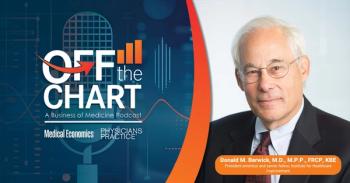
Physicians Share Healthcare Reform Concerns
As part of our annual Great American Physician Survey, we asked physicians about the healthcare issues worrying them the most.
For the 8th annual Physicians Practice
Physicians Practice reached out to a handful of respondents to learn more about the healthcare reform issues practicing physicians feel strongest about.
Protection for Patients with Pre-existing Conditions
Patients with pre-existing conditions are of the utmost importance to pediatricians like Alison Days, MD, of El-Paso, Texas. She became concerned with healthcare reform after reading that a [woman receiving a] caesarean section or children's asthma could make it hard for patients to obtain health insurance if new health laws were to pass.
In July, the GOP Senate's
"As a pediatrician, trying to record health conditions of young patients, it's difficult to mark [the conditions] down while thinking to yourself, 'one day these could lead to the patient not having health insurance,'" says Days.
Days is perplexed by the current administration’s choice to attempt to do away with one of the most popular parts of the Affordable Care Act (ACA). She says it may be time to bring some additional parties to the table during the reform process.
"I think people need to take health reform more seriously in the government. The people making healthcare decisions should not only be insurance companies and government officials, but also docs that are in private practice and docs that are in academic medicine…[Healthcare reform] affects us all differently," says Days.
Louis Weinstein, an ob-gyn at the Barrier Islands Free Medical Clinic in Johns Island, S.C., says he believes strongly in preserving pre-existing condition protections.
"We're seeing [many] more patients with pre-existing conditions now than we did one or two decades ago, due to the increase in diabetes, hypertension, and obesity," he says.
Weinstein and Days share the same uncertainty when it comes to the future. Both are concerned that the proposed bills aimed at abolishing Obamacare would reportedly decrease the amount of Americans covered by Medicaid, according to the Congressional Budget Committee (CBO). This would ultimately affect those with pre-existing conditions, many of whom are lower-income.
"These people need healthcare. If you have a preexisting condition and it's under control because you have insurance, you should be allowed to continue that health insurance. If you're knocked [off coverage] because of your preexisting condition, your healthcare is liable to get worse and then you end up in the ER and the cost of healthcare goes up again," says Days.
Weinstein also mirrored Days' thoughts on patients with pre-existing conditions going uninsured ultimately costing both the insurance companies and government more money. "It is more expensive to care for patients with pre-existing conditions after a condition has worsened, rather than treating it early on," says Weinstein.
Deborah Winiger, MD is a family practitioner based in Vernon Hills, Ill., who says the pre-existing conditions mandate under the ACA was one of the only reasons she liked the law. "These were people who could not get insurance due to conditions that were beyond their control. They were basically blackballed from ever getting insurance," says Winiger.
Days, Weinstein, and Winiger all say that the ACA is far from perfect and are not opposed to healthcare reform of some sort in the near future, as long as that reform doesn't remove protection for these patients. "A patient with pre-existing conditions needs to be protected somehow, whether it's by the government or through private insurance. As long as they are protected, I can live with it," says Weinstein.
Increasing Competition among Health Insurers
Kate Roberts, MD, is a Virginia-based endocrinologist who has long been frustrated with the lack of competition against Anthem health Insurance in her region. "They come to you and say, 'here's what we're going to pay you,' and that's it. Because they are a major player, they can do that," says Roberts. "They are my biggest payer, and my worst payer."
With Anthem being far-and-away the biggest player in Virginia's healthcare market, there is no room for negotiations, and with no end in sight, Roberts doesn't see change coming any time soon. "I know that Anthem wants to keep getting bigger and bigger and that medicine is in trouble because of it. If doctors keep getting boxed in and told how to do their job they will eventually walk out," says Roberts.
Opening her own practice has been Roberts' way of "walking out" while she constantly hears her peers talking about how much working for a large health network has changed due to reporting requirements using the EHR.
"If I worked for a big hospital, I know they would fire me because I spend way too much time with my patients. They fired one of my friends because she wasn't making them enough money. All of her [patient] surveys said she was fabulous, but she didn't see enough patients," says Roberts.
Susan Taylor, MD, is another private practice physician who says she would like to see additional competition in the insurance market in her region of Columbus, Miss.
"The insurance options available in our area don't provide that much healthcare under the ACA. One of the plans in the area won't pay me, so I cannot see patients with that plan," says Taylor. Another plan available in her area has all of its providers located three hours away, so families have to take a day off from work and drive down to be treated, according to Taylor.
Taylor sees patients with a wide variety of insurance plans, from Medicare and commercial insurance, to high-deductible plans and self-payers. Depending on their insurance plan, Taylor finds that the majority of patients come in to be treated only when they are in dire need due to high costs.
"[Payers] save money at the expense of patients and the quality of care that is given out while the CEOs of their companies make millions in salary," says Taylor.
Like Roberts, Taylor doubts she could stay employed by a hospital system due to the stringent reporting requirements and time constraints. The hospitals need to see a certain amount of patients so they can cover their overhead costs and pay your salary, but there are very few patients with medical problems that can be taken care of in a matter of minutes, according to Taylor.
"I don't think insurance companies want any competition. This way they have an excuse for being able to charge whatever they want. They have become bottom-line manipulators. They lobby in Washington, pay off politicians, and the American people are suffering because of it," says Taylor.
Insurance companies telling patients who they can see based on which physicians are in and out of network is eroding the overall quality of healthcare, according to Taylor. "Healthcare was better when a patient chose a physician and they would do what was best for the patient," she says.
Onus on the Physician
When asking respondents if they had any additional concerns about healthcare reform it was hard to ignore the sighs, groans, and chuckles that resulted. The Physicians Practice Great American Physician Survey gave them just a handful of options to choose to be concerned with, when the reality is physicians are worried about many more.
"Documenting for the government is not improving the quality of care for patients," says Taylor, who says the way the government is going about improving healthcare is to its own detriment. According to Taylor, her reimbursement for patients has not gone up dramatically over the last 20 years, but her overhead costs have, thanks to reporting regulations.
Winiger agrees, saying much of her time is spent adhering to government regulations, something deeply concerning. "I used to leave the office within a half hour of seeing my last patient," says Winiger, who now stays 90 minutes after seeing her last patient and routinely brings work home. Winiger does not believe she is taking any less care of patients, but acknowledges that constantly evolving government requirements are a massive burden.
"I wish I could work longer days, but that's not possible. I cannot keep this up," she says.
Roberts agrees with Winger's' concerns, fearing that healthcare reform is a runaway train moving too fast for its own good. "There's so much going on in healthcare with so many unintended consequences that we cannot keep up," she says.
Roberts says properly measuring the effects of healthcare reform takes time. She acknowledges that publications and associations are collecting data, but says that the burden on physicians to collect the data will ultimately drive many physicians from continuing to practice.
"When you retire and go to look for a doctor, I really hope there are some left. When you practice medicine using checklists, it gets really sad," says Roberts.
Newsletter
Optimize your practice with the Physicians Practice newsletter, offering management pearls, leadership tips, and business strategies tailored for practice administrators and physicians of any specialty.









